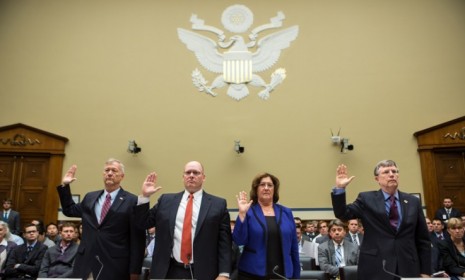Congress' hyper-partisan Benghazi hearings: The fallout
A GOP-led committee aggressively questions State Department officials about the assault that killed Ambassador Chris Stevens. What happens next?

A free daily email with the biggest news stories of the day – and the best features from TheWeek.com
You are now subscribed
Your newsletter sign-up was successful
With the presidential election rapidly approaching, Republicans on a House oversight committee grilled State Department officials on Wednesday about allegedly inadequate security at the Benghazi consulate on Sept. 11. Two former leaders of the U.S. security team in Libya said Obama administration officials had turned down a request for more security, and argued that given previous terrorist attacks in Benghazi, it was clear the consulate was at risk. However, one of the witnesses, former Tripoli embassy security chief Eric Nordstrom, conceded that even a beefed-up protection detail wouldn't have been able to repel what the State Department called an "unprecedented attack" by dozens of heavily armed militants. Perhaps predictably, the hearing was punctuated with "partisan bickering." Rep. Jason Chaffetz (R-Utah), a frequent campaign surrogate for Mitt Romney, said "we could have and should have saved the life of Ambassador [Chris] Stevens and the other people who were there." Rep. Elijah Cummings (D-Md.) said House Republicans were the ones who cut hundreds of millions of dollars from the diplomatic security budget last year. Where will the political jabs and the investigation into the attack lead? Here, four likely consequences of the hyper-partisan hearing:
1. The GOP will use this to erode Obama's foreign policy edge
Foreign policy has been one of President Obama's "points of strength amid an anemic economic recovery," says Frank Thorp at NBC News. His overseas achievements, "such as the killing of Osama bin Laden and withdrawal from Iraq," are elements of his resume that Romney just can't match. Sensing an opportunity to chip away at this advantage, Republicans on the committee and in the Romney campaign accused Obama and his administration of misleading the American public by suggesting immediately after the attack that it might have been sparked by an anti-Islam film that has been blamed for protests across the Muslim world. GOP leaders say that's naive, a characterization Obama "would like to avoid going into the final four weeks of the campaign."
The Week
Escape your echo chamber. Get the facts behind the news, plus analysis from multiple perspectives.

Sign up for The Week's Free Newsletters
From our morning news briefing to a weekly Good News Newsletter, get the best of The Week delivered directly to your inbox.
From our morning news briefing to a weekly Good News Newsletter, get the best of The Week delivered directly to your inbox.
2. Obama and Hillary Clinton will have to explain themselves
For days, the Obama administration suggested the Libya attack was sparked by the anti-Islam film, says Daniel Halper at The Weekly Standard. "Now, nearly a month later, the Obama administration is changing its story altogether," and admitting that this was a terrorist attack, pure and simple. There's even evidence that the outbursts in Egypt, Yemen, and elsewhere were also carried out by al Qaeda. Obama has been saying on the campaign trail that the terrorist network is "on its heels." But that's not necessarily so, and clearly, he and Secretary Clinton have some explaining to do.
3. The GOP may be blowing the CIA's cover in Libya
"Republicans were aiming to embarrass the Obama administration over State Department security lapses," says Dana Milbank at The Washington Post. The main thing their "boneheaded" grandstanding did, however, was expose a CIA facility in Benghazi that was supposed to be kept secret. The GOP attack dogs on the committee left "little doubt" that the facility — called a "safe house" or "annex" — was in reality a CIA base. If the CIA played a big role in the Benghazi events, "which was the unmistakable impression left by Wednesday’s hearing, having a televised probe of the matter was absurd." Thanks, guys, for the fresh reminder that "'congressional intelligence' is an oxymoron."
A free daily email with the biggest news stories of the day – and the best features from TheWeek.com
4. Both sides will keep focusing on scoring political points
Sadly, says Alex Koppelman at The New Yorker, we're unlikely to really find out "what exactly went wrong and why" so we can "take steps to save lives in the future." Judging by Wednesday's theatrics, we'll keep on following a familiar pattern: "The opposition party prosecutes and grandstands; the president's party deflects, covers, and complains. The fact that we are so close to an election only makes matters worse." Still, considering the lives lost and those still at risk, "it would have been nice to see something different for a change."
-
 Is Andrew’s arrest the end for the monarchy?
Is Andrew’s arrest the end for the monarchy?Today's Big Question The King has distanced the Royal Family from his disgraced brother but a ‘fit of revolutionary disgust’ could still wipe them out
-
 Quiz of The Week: 14 – 20 February
Quiz of The Week: 14 – 20 FebruaryQuiz Have you been paying attention to The Week’s news?
-
 The Week Unwrapped: Do the Freemasons have too much sway in the police force?
The Week Unwrapped: Do the Freemasons have too much sway in the police force?Podcast Plus, what does the growing popularity of prediction markets mean for the future? And why are UK film and TV workers struggling?